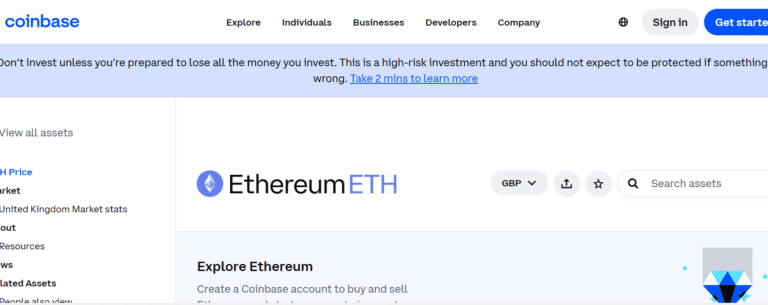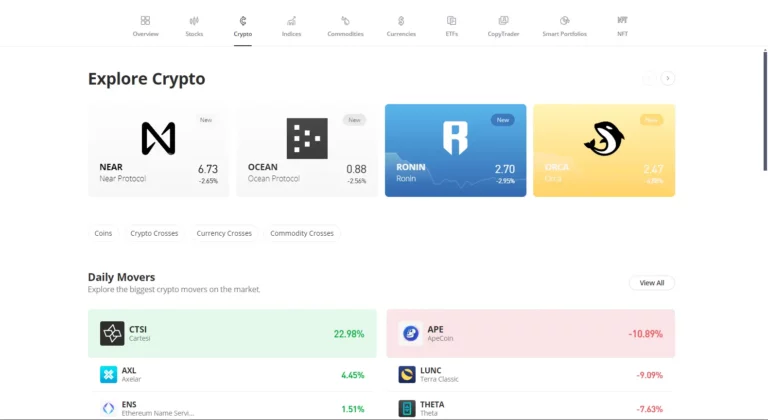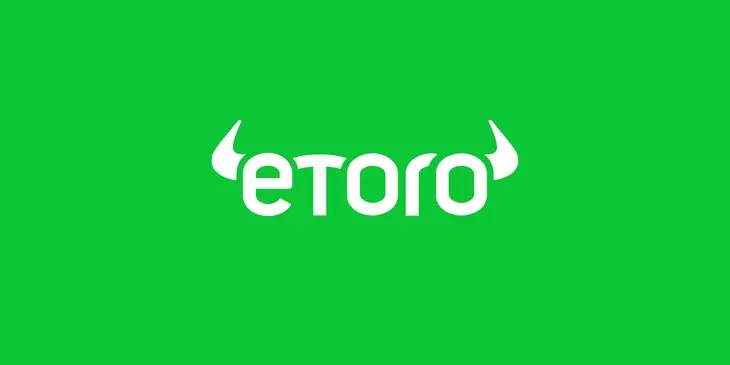How to Buy Ethereum in the UK

Adam Woodhead
Co-Founder
Adam is a Co-Founder and content creator for The Investors Centre. His key areas of interest and expertise are cryptocurrency and blockchain technology.
Twitter ProfileAuthor Bio

Thomas Drury
Co-Founder
Seasoned finance professional with 10+ years' experience. Chartered status holder. Proficient in CFDs, ISAs, and crypto investing. Passionate about helping others achieve financial goals.
Twitter ProfileAuthor Bio
Fact Checked
How we test
At The Investors Centre, we pride ourselves on our rigorous fact-checking process. To delve deeper into our meticulous testing procedures and discover how we ensure accuracy and reliability, visit our dedicated page on how we test.
Risk Warning
Don’t invest unless you’re prepared to lose all the money you invest. This is a high-risk investment and you should not expect to be protected if something goes wrong. Take 2 mins to learn more.
Updated 01/01/2025
Explore our curated list of reputable exchanges for buying ETH, each rigorously tested with real funds. All brokers are accessible to traders in the United Kingdom.
To Buy Ethereum in the UK, you'll need to:
Quick 2025 Outlook for Ethereum...
Ethereum in 2025 looks promising with potential for new all-time highs driven by institutional adoption and technological advancements. However, competition from other blockchains and market volatility remain key challenges. Continued growth in DeFi and NFTs suggests a positive outlook, but caution is advised.
Featured Exchange

eToro
- Copy Trading
- User Friendly Platform
- Regulated & Trusted
- 30 Million+ Users
Don’t invest unless you’re prepared to lose all the money you invest. This is a high-risk investment and you should not expect to be protected if something goes wrong. Take 2 mins to learn more.
Ethereum was one of the first cryptocurrencies I ever bought when it first attracted my attention during the last bull run.
My initial purchase was very much a FOMO type investment. I made a few mistakes and paid higher fees than was ideal. Nowadays I buy Cryptocurrencies more optimally with significantly lower fees.
Ethereum has become the backbone of decentralised finance (DeFi), powering thousands of applications and innovations.
As the UK embraces cryptocurrency adoption, buying Ethereum (ETH) is simpler than ever.
This guide is designed to provide a clear and practical approach to buy Ethereum in the UK.
A Step-by-Step Detailed Guide on Buying Ethereum
#1 Choosing a Cryptocurrency Exchange
Research and select a cryptocurrency exchange that lists Ethereum and is accessible in your region. Popular choices often include Best Wallet, Coinbase, and eToro.
Review the exchange’s fee structure, security measures, and user reviews to ensure it meets your needs.
Choosing the Right Exchange
Choosing the right exchange is the cornerstone of buying Ethereum. Start by prioritizing security measures such as two-factor authentication (2FA) and cold storage of funds to protect your assets.
Fees are another critical aspect, as they can vary widely between exchanges. Consider transaction fees, deposit fees, and withdrawal fees when making your choice.
User experience is also important, especially for beginners. Opt for platforms with intuitive interfaces and reliable customer support to ease your trading experience.
Additionally, regulatory compliance is vital for UK investors. Ideally, the exchange should be registered with the Financial Conduct Authority (FCA) to comply with UK financial regulations.
Comparison of Top Exchanges
- eToro: Best for beginners and social trading.
- Coinbase: Ideal for casual users with simple tools and strong security.
- Coinbase Advanced Trade: Suited for experienced traders with lower fees and advanced tools.
- Best Wallet: Great for low fees, multi-asset trading, and a user-friendly experience.
| Feature | eToro | Coinbase | Coinbase Advanced Trade | Best Wallet |
|---|---|---|---|---|
| Ease of Use | Beginner-friendly, social trading features | Simple interface, ideal for beginners | Advanced tools, suited for experienced traders | User-friendly, simple interface for multi-asset trading |
| Fees | 1% trading fee | 1.49% transaction fee | Lower fees (0.4% maker, 0.6% taker) | Low fees (0.08% maker, 0.10% taker) or spread-based pricing (0.8-1.2%) |
| Funding Options | Bank transfer, debit/credit card | Bank transfer, debit/credit card, PayPal | Bank transfer, debit/credit card | Bank transfer, debit/credit card |
| Crypto Selection | 75+ cryptocurrencies | 240+ cryptocurrencies | 240+ cryptocurrencies | 350+ cryptocurrencies |
| Security | FCA-regulated, 2FA, cold storage | Insured funds, 2FA, cold storage | Insured funds, 2FA, cold storage | Strong security, cold storage, 2FA |
| Extras | CopyTrading, multi-asset platform | Educational tools, staking | Advanced charting, order types, lower fees | Multi-asset trading, competitive spreads |
#2 Creating an Account
Creating an account takes minutes.
- Visit the exchange’s website or download its mobile app.
- Enter your email address and create a strong password.
- Complete KYC by uploading ID documents (e.g., passport, driver’s license) and proof of address.
- Verification typically takes a few hours but can vary by platform.
#3 Securing Your Account
Before depositing funds, secure your account:
- Enable 2FA: Use apps like Google Authenticator for an added security layer.
- Choose a strong password: Combine upper and lower-case letters, numbers, and symbols.
- Beware of phishing scams: Always verify the platform’s URL before logging in.
#4 Depositing Funds
Most exchanges accept multiple payment methods:
- Bank Transfer: Usually fee-free but may take 1-3 days to process.
- Debit/Credit Cards: Instant deposits but higher fees (2-4%).
- PayPal: Available on some platforms but often incurs additional charges.
Ensure the exchange supports GBP deposits to avoid conversion fees. Double-check the deposit details to prevent errors.
#5 Placing a Buy Order for Ethereum
Once your account is funded:
- Navigate to the Ethereum section (ticker symbol: ETH).
- Choose your order type:
- Market Order: Buy instantly at the current price—simple but subject to market fluctuations.
- Limit Order: Set a specific price at which you want to buy. The order will execute only if the price reaches your target.
- Enter the amount you want to invest, review fees, and click Buy.
#6 Reviewing and Confirming the Purchase
Before confirming your order:
- Check the Ethereum price and ensure it aligns with your investment plan.
- Review fees to understand the total cost.
- Confirm the transaction to complete your purchase.
#7 Transferring Ethereum to a Wallet
Leaving Ethereum on an exchange exposes it to potential hacking.
- Hot Wallets: Convenient but connected to the internet, increasing vulnerability.
- Cold Wallets: Hardware wallets like Ledger or Trezor offer offline storage and are ideal for long-term security.
More on the Best Crypto Wallets here
#8 Withdrawing to Your Wallet
To transfer Ethereum to a wallet:
- Copy your wallet’s public address.
- Go to the withdrawal section on your exchange.
- Paste the address, double-check it for accuracy, and confirm the transfer.
#9 Tracking Your Investment
Stay informed by:
- Using apps like CoinMarketCap to track Ethereum’s price in real-time.
- Setting price alerts for significant market movements.
- Reviewing portfolio performance periodically.
#10 Selling or Using Ethereum
When you’re ready to sell Ethereum or use it:
- Return to your exchange and select Sell.
- Convert ETH back to GBP or another cryptocurrency.
- Withdraw funds to your bank account. Alternatively, explore DeFi apps or NFTs where Ethereum can be utilised.
Where to Buy Ethereum

#1 eToro - Best in class for ease of use, simplicity and quick sign up
eToro is highly rated for its intuitive platform and quick setup process, making it ideal for beginners. Its standout feature, CopyTrader, allows users to mimic successful investors. With FCA regulation and a built-in wallet, eToro is a safe, versatile option for Ethereum.
Pros & Cons
- Pros: Easy to use, FCA-regulated, multi-asset platform, CopyTrading feature.
- Cons: Higher fees compared to advanced platforms, limited features for pro traders.
What are the Fees?
eToro charges a 1% fee per trade. Additional fees apply for withdrawals (£5) and currency conversion if GBP is not the base currency.
What Cryptocurrencies are Available?
eToro offers 75+ cryptocurrencies, including Bitcoin, Ethereum, Ripple (XRP), Cardano (ADA), and Solana (SOL).
How Safe is the Exchange?
eToro employs 2FA, cold storage, and FCA regulation to ensure fund safety. User funds are also insured against platform breaches, adding extra peace of mind.
Don’t invest unless you’re prepared to lose all the money you invest. This is a high-risk investment and you should not expect to be protected if something goes wrong. Take 2 mins to learn more.

#2 Coinbase - The go-to platform for beginners
Coinbase simplifies the process of buying Ethereum with its intuitive interface and robust educational resources. It’s one of the most secure platforms available and is well-suited for first-time crypto buyers in the UK.
For Coinbase comparisons consider visiting our pages Kraken vs Coinbase, Coinbase vs Binance or Best Coinbase Alternatives UK
Pros & Cons
- Cons: Higher fees for smaller trades, no advanced trading options.
- Pros: Easy to use, high-security measures, supports GBP deposits.
What are the Fees?
Coinbase charges 1.49% per transaction on its standard platform. For lower fees, opt for Coinbase Advanced Trade (starting at 0.4% maker and 0.6% taker fees).
What Cryptocurrencies are Available?
Supports over 240 cryptocurrencies, including Bitcoin, Ethereum, Solana, and Cardano.
How Safe is the Exchange?
With cold storage for most assets and FCA registration, Coinbase offers a highly secure trading environment. Two-factor authentication (2FA) adds an extra layer of protection.
Don’t invest unless you’re prepared to lose all the money you invest. This is a high-risk investment and you should not expect to be protected if something goes wrong. Take 2 mins to learn more.

#3 Best Wallet – Multi-Asset Trading, Low Fees
Best Wallet excels in multi-asset trading, supporting cryptocurrencies and fiat currencies. With low fees and a user-friendly interface, it’s an excellent option for those looking to invest in Ethereum and diversify their portfolio.
Pros & Cons
- Pros: Multi-asset support, low fees, user-friendly app, and secure trading environment.
- Cons: Spread-based pricing, fewer advanced trading tools compared to pro-focused platforms.
What are the Fees?
Best Wallet does not charge trading fees but applies spreads of 0.8%-1.2% for Ethereum trades. Withdrawal fees vary depending on the asset and withdrawal method.
What Cryptocurrencies are Available?
Best Wallet offers 350+ cryptocurrencies, including Ethereum, Bitcoin, Litecoin (LTC), Polygon (MATIC), and Chainlink (LINK).
How Safe is the Exchange?
Best Wallet implements 2FA, cold storage, and robust security measures to protect user assets. It is widely trusted with millions of global users and ensures transparent operations.
Don’t invest unless you’re prepared to lose all the money you invest. This is a high-risk investment and you should not expect to be protected if something goes wrong. Take 2 mins to learn more.
What is Ethereum?
Ethereum is a decentralised blockchain platform that powers smart contracts and decentralised applications (dApps). It enables developers to build applications without central authority interference. The Ethereum cryptocurrency, known as Ether (ETH), is used to pay for transactions on the network. Its versatility has made Ethereum the backbone of the DeFi ecosystem.
How Does Ethereum Work?
Ethereum’s blockchain relies on a decentralised network of computers to verify transactions. Transactions incur gas fees, paid in Ether, to incentivise miners (or validators). Unlike Bitcoin, Ethereum’s flexibility enables dApps in various fields, from finance to gaming. It’s also the foundation for NFTs (Non-Fungible Tokens) and DeFi platforms, revolutionising global finance.
Is Ethereum a Good Investment?
Ethereum is a leading cryptocurrency with a strong track record of innovation and adoption. It supports emerging technologies like DeFi and NFTs, driving its value. However, its price volatility and competition from other blockchains pose risks. Research thoroughly and invest only what you can afford to lose.
What are the Risks of Ethereum?
Ethereum’s value fluctuates due to market volatility, regulatory challenges, and technological competition from newer blockchains. The transition to Ethereum 2.0, while promising, may introduce unforeseen issues. Additionally, high gas fees can deter users, impacting adoption rates. Ensure you understand these risks before investing.
FAQs
Smart contracts are self-executing contracts with the terms of the agreement directly written into code. On Ethereum, these contracts are programmed in languages such as Solidity or Vyper and are automatically executed by the Ethereum Virtual Machine (EVM) when predetermined conditions are met. This automation reduces the need for intermediaries and can streamline all kinds of transactions and applications.
The primary difference is their purpose and capability. Bitcoin was created as an alternative to national currencies and thus aspires to be a medium of exchange and a store of value. Ethereum, on the other hand, was designed as a platform to facilitate immutable, programmatic contracts, and applications via its own currency. Ethereum supports not only transactions but complex contracts and programs.
Ether is the native cryptocurrency of the Ethereum platform. It is used to compensate participating nodes for computations performed and to pay for transaction fees and computational services on the Ethereum network. Users need to have Ether to interact with dApps and to execute smart contracts on the Ethereum platform.
Scalability has been a significant challenge for Ethereum, especially as the adoption of its network has grown. Layer 2 solutions are protocols that operate on top of the Ethereum blockchain to increase its capacity and speed. Examples include rollups, state channels, and sidechains, which process transactions off the main Ethereum chain but leverage its security and decentralization features. These solutions are crucial for handling more extensive and complex workloads on the Ethereum network
Top 5 Exchanges
1

eToro
Don’t invest unless you’re prepared to lose all the money you invest. This is a high-risk investment and you should not expect to be protected if something goes wrong. Take 2 mins to learn more.
2

Coinbase
Don’t invest unless you’re prepared to lose all the money you invest. This is a high-risk investment and you should not expect to be protected if something goes wrong. Take 2 mins to learn more.
3

Best Wallet
Don’t invest unless you’re prepared to lose all the money you invest. This is a high-risk investment and you should not expect to be protected if something goes wrong. Take 2 mins to learn more.
4

MEXC
Don’t invest unless you’re prepared to lose all the money you invest. This is a high-risk investment and you should not expect to be protected if something goes wrong. Take 2 mins to learn more.
5

OKX
Don’t invest unless you’re prepared to lose all the money you invest. This is a high-risk investment and you should not expect to be protected if something goes wrong. Take 2 mins to learn more.







